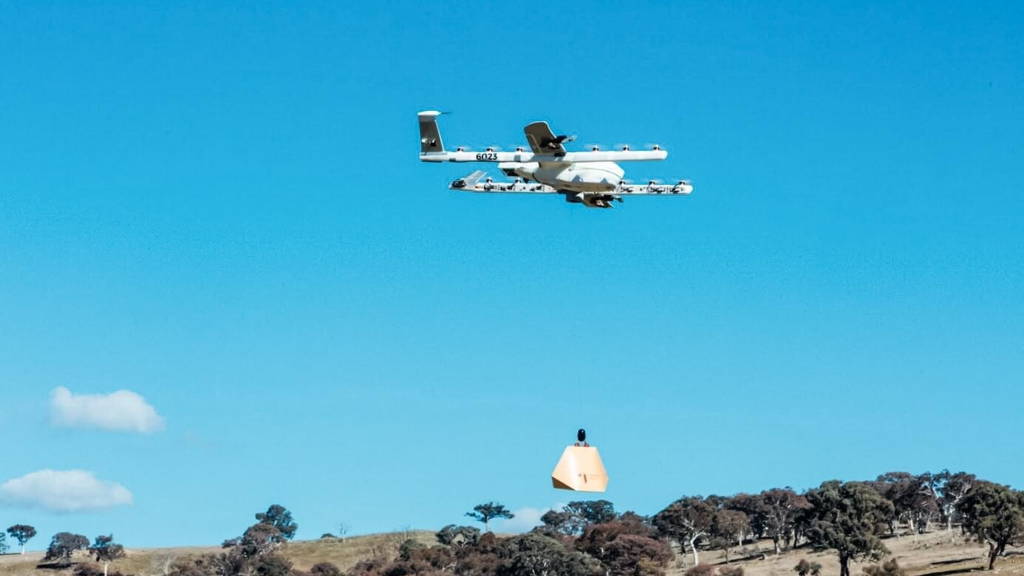Over the past few years, Project Wing has conducted thousands of flights to get its drone delivery technology ready for everyday use. Early 2016 saw the successfully completion of the first drone deliveries to members of the public in an open field at Virginia Tech University. This fall wtesting commenced in a rural community on the border of the ACT and NSW, tackling an entirely different level of operational complexity: making deliveries directly to people’s yards.
The parties involved are Guzman y Gomez, a Mexican food chain, and Chemist Warehouse, a chain of pharmacies. Thwy will receive orders from testers who’ve purchased items using the Project Wing app on their smartphones. The drones will pick up the order from the partners’ loading sites and then transport and deliver the goods to testers at their residences.
They also had ideas about delivery drones being used to transport drinking water, food, medical supplies, and mechanical parts to emergency service workers operating in rural areas or places cut off due to floods and fires. As part of our upcoming tests, Project Wing will help the Australian Capital Territory Rural Fire Service assess how its technology could aid their efforts.
Burgess: ‘Through our partnership with Chemist Warehouse, we want to ensure our system is able to support merchants with a wide variety of products. As part of this test, they’re offering nearly 100 products across categories like vitamins, dental care, sun care, and over-the-counter medicines. By practicing how we pack items of very different shapes and sizes into our fixed-sized package, we’ll learn how to optimize how many items we’re able to deliver per flight.’
Testing of medical deliveries
The testers?—?from alpaca farmers tot math professors?—?have been helping to fine-tune how the drones move goods from where they’re located to where they’re needed. Now two Australian merchants are joining the tests, as they’re eager to understand how drone delivery could help them serve their customers better.The parties involved are Guzman y Gomez, a Mexican food chain, and Chemist Warehouse, a chain of pharmacies. Thwy will receive orders from testers who’ve purchased items using the Project Wing app on their smartphones. The drones will pick up the order from the partners’ loading sites and then transport and deliver the goods to testers at their residences.
Long trips for medical supplies
Residents near the testing area on the outskirts of the ACT live an idyllic country lifestyle on 10-acre blocks of rolling land spotted with gum trees and horses. But they face a 40-minute round trip in the car for almost anything, whether it’s a carton of milk, veggies for dinner, or a cup of coffee. Almost all said that they’d value having medicine delivered to their door, especially when they’re unwell.They also had ideas about delivery drones being used to transport drinking water, food, medical supplies, and mechanical parts to emergency service workers operating in rural areas or places cut off due to floods and fires. As part of our upcoming tests, Project Wing will help the Australian Capital Territory Rural Fire Service assess how its technology could aid their efforts.
Training systems for reliable delivery
‘Our drones are able to deliver items almost anywhere?—?backyards, public parks, farmlands or even fire-breaks, Burgess writes. ‘ But we need to train our systems to reliably identify safe and convenient delivery locations. This is more complicated than it looks. We have to incorporate customer preferences?—?e.g. many of our testers would like packages delivered to backyards so they’re not visible from the road, or near kitchens so food items can be unpacked quickly. And we have to be ready to accommodate changing conditions at the delivery location. The more test deliveries we do, exposing the sensors on our aircraft to new delivery locations, the smarter our aircraft’s algorithms will one day become at picking a safe spot for deliveries.’Smooth loading and delivery
Project Wing partners Guzman y Gomez and Chemist Warehouse will help with learning what needs to be done to ensure that orders are channeled to their staff smoothly and that they can easily load goods onto delivery drones.Burgess: ‘Through our partnership with Chemist Warehouse, we want to ensure our system is able to support merchants with a wide variety of products. As part of this test, they’re offering nearly 100 products across categories like vitamins, dental care, sun care, and over-the-counter medicines. By practicing how we pack items of very different shapes and sizes into our fixed-sized package, we’ll learn how to optimize how many items we’re able to deliver per flight.’
